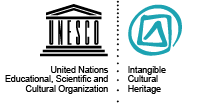Commemoration feast of the finding of the True Holy Cross of Christ
Inscribed in 2013 (8.COM) on the Representative List of the Intangible Cultural Heritage of Humanity
Country(ies): Ethiopia
Identification
Description

- Commemoration feast of the finding of the True Holy Cross of Christ
- © 2011 by the Authority for Research and Conservation of Cultural Heritage (ARCCH)
The festival of Maskel is celebrated across Ethiopia on 26 September to commemorate the unearthing of the True Holy Cross of Christ. Celebrations begin with the building of the Damera bonfire in Maskel Square in Addis Ababa – a conical pyre of poles surrounded by bundles of branches and torches, decorated with green grass and Abyssinian daisies symbolizing the New Year. Hundreds of thousands of people from diverse communities flock to the square as colourfully dressed priests chant hymns and prayers and perform their unique rhythmic dance in front of the pyre. At the climax, the patriarch of the Ethiopian Orthodox Tewahedo Church lights the bonfire. Maskel is celebrated nationwide regardless of age, gender, language or ethnicity. Participants are believed to receive spiritual rewards from the celebration and blessings from the Holy Cross. Local churches play a key role in coordinating communities and safeguarding the element. The festival is also a time when families get together and migrant workers return home – reunions that result in the inflow of money, information and new ideas from urban centres to rural areas. Prior to the celebration, personal quarrels and social disagreements must be resolved. In this way, Maskel is an occasion for Ethiopians to promote their spiritual life through reconciliation, social cohesion and peaceful coexistence.
Documents
- Nomination form: English|French
- Consent of communities: Amharic/English
- ICH inventory: Amharic
Decision 8.COM 8.11
The Committee (…) decides that [this element] satisfies the criteria for inscription on the Representative List of the Intangible Cultural Heritage of Humanity, as follows:
- R.1: Rooted in the religious and cultural traditions of Ethiopia and passed on from generation to generation, the festival of Maskel promotes social unity, integration and diversity across the nation;
- R.2: Inscription of the festival of Maskel on the Representative List could enhance the visibility of intangible cultural heritage and promote inter-cultural dialogue among the multi-ethnic population of Ethiopia, as well as other communities internationally;
- R.3: Past and on-going safeguarding measures demonstrate the commitment of the community, religious groups and national authorities to ensure the viability of the festival of Maskel;
- R.4: The process of preparing the nomination benefited from widespread consultation and participation including several representatives of ethnic and religious groups who gave their free, prior and informed consent;
- R.5: With the participation of communities, the festival of Maskel was included in 2011 in the National Register of the Intangible Cultural Heritage of Ethiopia maintained by the Authority for Research and Conservation of Cultural Heritage.
Recalls that the primary objective of the Convention is safeguarding intangible cultural heritage and invites the State Party to take measures to adequately manage commercialization, to mitigate its possible negative impacts and to avoid decontexualization of the element for the purpose of tourism.
Slideshow
Video
© 2011 by the Authority for Research and Conservation of Cultural Heritage (ARCCH)
These videos (and many more) can also be consulted through the UNESCO Archives Multimedia website











